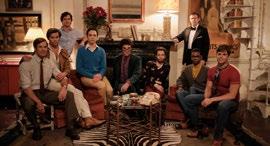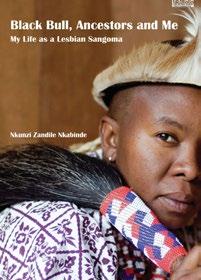
10 minute read
African Queer Artists you
AFRICAN QUEER ARTISTS you should know
JAMAL GROOTBOOM
Advertisement
Music is an integral part of many African nations with various genres having gained global popularity including Afrobeats from Nigeria and gqom from South Africa. And while many artists from the continent have gone on to receive global recognition, when it comes to queer representation there still a lot of room for some queers in this house. To help you, we’ve compiled a list of seven queer music artists who you need to know.
DESIRE X
ONE of half queer supergroup FAKA, Desire has been an unmistakenly queer artist who has travelled the world because of their unique outlook of queerness with a very in your face approach in the visuals both live and in their music. With FAKA’s music even being the inspiration for Versace’s S/S 2019 collocation landing them and fellow bandmate Fela Gucci to be front row at the show but also having the world take note.
Recently they dropped their first solo album, Desire, which saw the artist push boundaries thematically with regards to queer expression and sonically playing with various genres including gqom and various club infused subgenres. They are a voice that had changed the queer scene for both South Africa and the continent.
TROYE SIVAN

While Troye Sivan started his journey as the lead actor in the Spud movies he later gained popularity on YouTube and spun that off into a highly successful singing career. When Troy came out in 2013 it was a big moment since he was the lead in a highly successful film series.
His debut album Blue Neighbourhood explored the trials and tribulations of queer adolescence. And for the time having an openly gay man making music that focused on queer love opened lots of people, especially his young audience at the time, to the normalcy of it. Although he is Australian, Troye was born in Johannesburg before his parents moved Down Under when he was 2 years old. And still today his music is unabashedly queer with him dropping his latest EP In a Dream in August.
LELO WHATSGOOD

As one of the premier DJs in the country, Lelo is not only getting the party started but is also using his platform as an activist for the queer community. Having played at fire sets at Boiler Room X Ballantine’s, Afropunk South Africa and an impromptu set at Rocking The Daisies, Lelo is one of very few DJs in the country that isn’t confined to one genre.
He is also the head honcho behind Vogue Nights Jozi, which was the first ballroom-based event in South Africa since the ballroom scene has found popularity again in the modern age, mostly due to the popularity of Pose on FX which has also led to the competition show Legendary airing on HBO.
DUA SALEH

SUDANESE-AMERICAN poet Dua Saleh is one of the newest queer musicians to be making waves in the music scene. Having started writing poetry from a young age, they recorded their song First Take in 2017 followed by their debut EP Nūr last year. Having gained overwhelmingly positive reviews with Pitchfork calling the EP “sophisticated, warm but industrial”. They dropped their second EP Rosseta in June which also received stellar reviews from music critics with Medium calling it “clean-cut and layered as it feels more substantial and complete” compared to their debut EP. Dua is also set to appear on the third season of the Netflix series Sex Education as a non-binary student.
ANGEL-HO

Cape Town rapper Angel-Ho has been a prolific musician when it comes to her music. Being a Black trans pioneer in music, Angel-Ho has made waves both on the continent for her gripping visuals and is one of the best experimental artists with her sound.
With her album Death Becomes Her being hailed by Pitchfork as one of the Best Experimental Albums of last year.
This year she dropped her EP Alla Prima which she describes as “hip-hop haute couture” and also used her queerness as the jumping point to express her art. Whether it be in songs, music videos or live performances. She’s been one of the biggest trans musicians to have come out of the continent.
MX BLOUSE

When it comes to hiphop whether it be on the continent or globally, queer bodies rarely get the same space or opportunity to shine. Johannesburg based rapper Mx Blouse is making waves for fusing kwaito, hip-hop and electronic music into an explosive sound.
While they got their start in journalism in South African media, when they moved to Joburg from Cape Town music was calling. Having dropped their debut EPRe: Mx last year, they released their first full album Elementality this year which received a positive response from fans and critics.
DOPE SAINT JUDE
Capetonian rapper Dope Saint Jude has been a queer voice in South Africa that’s been able to make her voice even through adversity. As a black queer ciswoman from the Cape Flats, she offers a unique outlook on the queer experience. And while hip-hop in Cape Town is popular, when it comes to queer bodies there is still pushback when it comes to breaking it in the very cis-het male-dominated space.
Dope Saint Jude dropped her EP Resilient in 2018 and after taking a bit of a break made her return this year with her single and music video Go High Go Low earlier this year, where she again used her outlook at a coloured queer woman from the Cape Flats as the centre point of the visual. The rapper resides in London where she is busy working on new music.

QUEER+ SHOWS

THE BOYS IN THE BAND
THE BOYS IN the Band is a movie adaptation of the 1968 stage play of the same name by Mart Crowley. Centred on a group of gay friends who reunite in the Upper East Side of Manhattan.
However, when the host, Michael’s, former college “straight friend” Alan pitches uninvited the whole night gets turned upside down.
Starring Jim Parsons as Michael, Zachary Quinto as Harold, Matt Bomer as Donald, Andrew Rannells as Larry, Charlie Carver as Cowboy and Robin de Jesús as Emory, Brian Hutchison as Alan McCarthy, Michael Benjamin Washington as Bernard and Tuc Watkins as Hank.
This film adaptation is special in the sense that all the characters are played by openly gay men.
Which is very rare, even today, although it might not seem relevant for queer people outside of the United States.
The film gives a brief look into the queer experience of gay in the late 1960s/70s since the play and movie take place a year before the Stonewall riots and predates the HIV and Aids crisis of the 80s and 90s.
What struck me about the film is how certain parts of gay culture are unchanged to this day.
One specific moment showed it was a scene where Alan asks where Harlod is and Emory responds that “she’s always late” and then quickly changes to using he/him pronouns so as to not confuse Alan.
The use of interchangeable pronouns among cisgender gay men is a very common occurrence and is an aspect found with many friends groups that have consisted of mostly cisgender gay men across the world, more colloquially known as a gaggle of gays. ● The Boys in the Band is streaming on Netflix

LOVECRAFT COUNTRY
Based on the 2016 novel of the same name by Matt Ruff, Lovecraft Country stars Jurnee Smollett as Letitia “Leti” Lewis and Jonathan Majors as Atticus “Tic” Freeman. The HBO show follows Tic and Leti as they navigate a Jim Crow 1950s Lovecraftian horror America.
The lead characters not only have to deal with segregation and overt racism but monsters, magic and science fiction.
The show isn’t specifically focused on black queer people, however, for the first part of the show several characters, both lead and supporting, are the focus of a single episode. Spoiler alert! As the show progresses, we find out Tic’s father Montrose Freeman, played by Michael K Williams, is a closeted gay man in the episode Strange Case.
In this episode, we are given a much-needed glimpse into the life of black queer people during the Jim Crow era.
Earlier in the season, we find out that Montrose’s love interest Sammy, played by Jon Hudson Odom, is very much an openly – well, as open as you could be in the 50s – gay man, with Montrose interrupting him during a cruising engagement in a back alley. Gay cruising describes the act of searching about a public place in pursuit of a partner for sex.
However, what stood out was how the screenwriters and showrunners have tackled Montrose and his queer identity, with him coming to terms with being a gay man and through the help of Sammy, and then embraces the larger members in black LGBTQI+ in their city. Seeing the evolution of Montrose is something not shown often, especially when it comes to DL (down low) closeted black gay men.
QUEER+ BOOKS

BLACK BULL, ANCESTORS AND ME Nkunzi Zandile Nkabinde
SHE’S a sangoma and a lesbian, bring out the wine because this is going to be a good read.
Nkunzi’s urge to live and draw others into her sense of interconnectedness emerges as a consistent theme in her story. As a sangoma, Nkunzi is able to explore dimensions of her sexual identity because of her relationship with both male and female ancestors.
“In Zulu culture, a man must be a man and do male things and a woman must be a woman and do female things but with sangomas, it is more flexible. I can dance like a woman and wear a woman’s clothes and dance like a man and wear a man’s clothes. I can do the work of a man, like slaughtering a goat or a cow although in traditional Zulu culture a woman cannot slaughter …”
Conscious of her constitutional rights as an urban young lesbian in a time of a relentless spate of hate crimes against township lesbians, Nkunzi is simultaneously sensitive to the demands of the guiding ancestral voice of the traditional, rural Zulu patriarch whose name she bears. She’s on a quest to find a middle path of balance and integration between the living and the dead, the traditional and the modern. FRESHWATER Akwaeke Emezi
Freshwater explores the surreal experience of having a fractured self. This award-winning, semi-autobiographical novel centres around a young Nigerian woman, Ada, who develops separate selves within her as a result of being born “with one foot on the other side”. Unsettling, heartwrenching, dark and powerful, Freshwater is a sharp evocation of a rare way of experiencing the world, one that illuminates how we all construct our identities.
Ada begins her life in the south of Nigeria as a troubled baby and a source of deep concern to her family. Her parents, Saul and Saachi, successfully prayed her into existence, but as she grows into a volatile and splintered child, it becomes clear that something went terribly awry. When Ada comes of age and moves to America for college, the group of selves within her grows in power and agency. A traumatic assault leads to a crystallisation of her alternate selves: Asụghara and Saint Vincent. As Ada fades into the background of her own mind and these selves – now protective, now hedonistic – move into control, Ada’s life spirals in a dark and dangerous direction. Narrated by the various selves within Ada and based in the author’s realities, Freshwater heralds the arrival of a fierce new literary voice.










